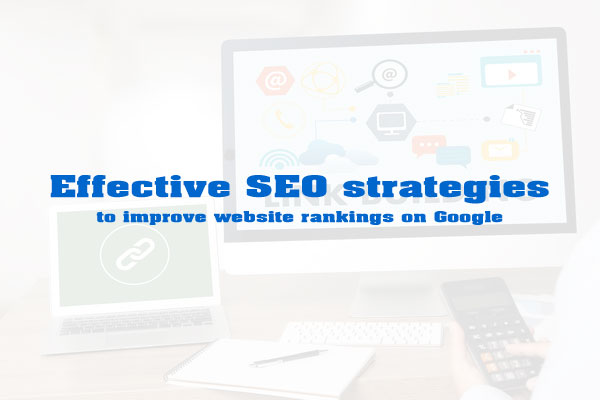Effective SEO strategies to improve website rankings on Google
- 1. Publish High-Quality & Authoritative Content
- 2. Regularly Update Website Content
- 3. Optimize Metadata
- 4. Build High-Quality Backlinks
- 5. Enhance User Experience (UX/UI)
- 6. Improve Website Loading Speed
- 7. Use Alt Text for Images
- Common SEO Mistakes to Avoid with Viet SEO
- Viet SEO Summarizes a Successful SEO Strategy
Implement these SEO strategies with Viet SEO to improve search rankings, increase traffic, and enhance user experience.
1. Publish High-Quality & Authoritative Content
Content is the most important factor in SEO. At VietSEO company, we emphasize creating valuable and authoritative articles that help boost website rankings and attract loyal readers.
- Create user-focused content – Write helpful content that meets the needs of your audience.
- Provide in-depth information – Showcase your expertise and knowledge on the subject.
- Update regularly – Google values websites that consistently improve and refresh their content.
a. Research & Use Keywords Strategically
Identify and optimize relevant keywords for each article, such as:
- "Online master's in engineering management"
- "Effective ways to apply for scholarships"
- "Differences between engineering and engineering technology"
Note:
- Focus each page on a primary keyword cluster.
- Avoid keyword stuffing—use keywords naturally throughout the content.
b. Proper Keyword Placement
Keywords should appear in key areas like:
- URL: Include the main keyword for better recognition.
- Title tag: Keep it short, compelling, and keyword-rich.
- Header tags (H1, H2, H3): Improve content structure and SEO.
- Article body: Naturally incorporate keywords, especially in the introduction, body, and conclusion.
2. Regularly Update Website Content
Search engines prioritize websites with fresh, relevant content. With Viet SEO services, you can maintain a consistent update schedule by:
- Reviewing and updating old content monthly or quarterly.
- Writing regular blog posts on industry-related topics to drive traffic.
Why Blogging Helps SEO
- Expands keyword reach.
- Engages readers, increasing dwell time.
- Enhances authority and credibility.
3. Optimize Metadata
Metadata helps search engines understand your content more effectively. At Viet SEO, we focus on optimizing titles, descriptions, and tags to improve visibility and click-through rates.
a. Title Tag
- The most important metadata element.
- Should include the primary keyword and be compelling.
- Ideal length: 50-60 characters.
b. Meta Description
- Provides a short summary of the page content.
- Should be engaging to encourage clicks.
- Recommended length: 150-160 characters.
c. Meta Keywords (Less relevant today but still useful)
- Select 3-7 keyword phrases (1-4 words each).
4. Build High-Quality Backlinks
Backlinks from reputable websites boost credibility and rankings. The VietSEO team specializes in building strong, relevant backlinks that drive sustainable SEO success.
✅ Best Practices:
- Link to relevant, high-authority sites.
- Use descriptive anchor text instead of “click here.”
- Gain backlinks from quality blogs, forums, and news sites.
❌ Avoid:
- Links from low-quality or spammy websites.
- Buying unnatural backlinks (Google may penalize this).
5. Enhance User Experience (UX/UI)
A user-friendly website keeps visitors engaged. At Viet SEO, we design and optimize websites to deliver seamless navigation, fast loading times, and an outstanding user experience.
- Clear, intuitive navigation – Improve site structure.
- Mobile-friendly design – Ensure the site works well on all devices.
- Attractive layout & visuals – Use balanced colors, images, and fonts.
6. Improve Website Loading Speed
Page speed impacts both SEO and user experience.
- Ideal loading time: Under 5 seconds.
- Optimize images: Use WebP or compressed JPG formats.
- Minimize heavy scripts (Flash & JavaScript): Ensure faster load times.
- Use caching & CDN: Reduce server load and improve performance.
7. Use Alt Text for Images
Alt tags help search engines understand images, improving SEO and accessibility. With VietSEO services, we ensure every image is properly optimized with descriptive alt text to enhance both search performance and user experience.
🔹 Best Practices for Alt Text:
- Keep descriptions concise and relevant.
- Include keywords naturally if appropriate.
- Avoid keyword stuffing.
Common SEO Mistakes to Avoid with Viet SEO
- 🚫 Low-quality or duplicate content
- ✅ Always create original, valuable content.
- 🚫 Keyword stuffing
- ✅ Use keywords naturally and strategically.
- 🚫 Poor-quality backlinks
- ✅ Only acquire links from reputable, relevant sources.
- 🚫 Ignoring mobile optimization
- ✅ Ensure your website is responsive across all devices.
- 🚫 Slow page speed
- ✅ Optimize images, code, and hosting for better performance.
- 🚫 Not updating content regularly
- ✅ Refresh and expand content frequently.
- 🚫 Neglecting user experience (UX)
- ✅ Improve layout, navigation, and usability.
- 🚫 Failing to track & analyze performance
- ✅ Use Google Analytics and Search Console to refine SEO strategies.
Viet SEO Summarizes a Successful SEO Strategy
- Publish high-quality, authoritative content.
- Regularly update content and use blogs to expand keyword reach.
- Optimize metadata (title, description, and keywords).
- Build strong backlinks while avoiding spammy links.
- Improve website design, speed, and user experience.
- Use alt tags for images to boost searchability.
- Avoid common SEO mistakes to prevent penalties.
With the support of Viet SEO agency, implementing these strategies becomes more effective, helping your website achieve higher rankings on search engines sustainably!



